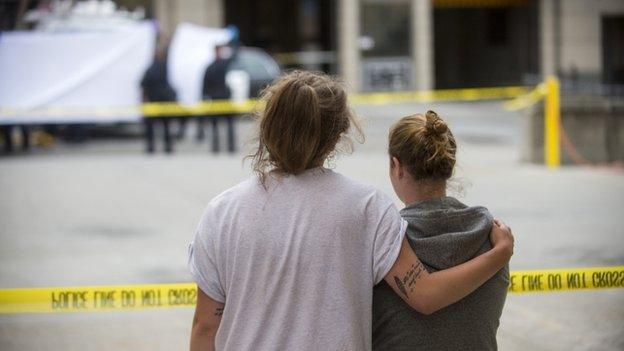Berkeley balcony collapse: 'No criminal charges' will be brought, district attorney says
- Published

Six students were killed when a balcony collapsed in Berkeley, California
The Californian district attorney investigating a balcony collapse that killed five Irish students and one Irish-American has said she will not be bringing any criminal charges in connection with the incident.
The balcony collapsed in Berkeley, California, on 16 June last year.
Seven other Irish students were critically injured.
Nancy O'Malley has said there is "insufficient evidence" to bring criminal manslaughter charges.
The California District Attorney said it was not a decision that she "came to lightly" and was the "culmination of months of consultation with my team of attorneys".

The victims: Top row, from left: Ashley Donohoe, Eimear Walsh, Olivia Burke. Bottom row, from left: Eoghan Culligan, Lorcan Miller and Niccolai Schuster
"It follows extensive review of reports, both legal and factual, and numerous meetings with investigators and experts," she added.
"Not a day has passed since the tragedy of June 16 that I have not thought of the victims and their families.
"I am keenly aware of the devastation and injuries each victim and each family suffered and continues to confront.
"Friends, families and entire communities both in California and in Ireland have been affected by the horror of that day."
Ms O'Malley said her office had provided substantial resources to the investigation and that it had involved a large team of prosecutors, investigators and multiple state agencies.
Five 21-year-old Irish students - Eoghan Culligan, Eimear Walsh, Niccolai Schuster, Olivia Burke, Lorcán Miller - and Ashley Donohoe, a 22-year-old Irish-American, died in the incident which happened during a 21st birthday party.
On Tuesday, Irish Foreign Affairs Minister Charlie Flanagan said his thoughts were with the relatives and friends of those who died.
"My department will carefully consider the details of the district attorney's findings," he said.
"While the district attorney's investigation did not find sufficient proof to take separate criminal proceedings, it has shone a vital light on the circumstances and factors that contributed directly and indirectly to the collapse of the balcony.
"This investigation is an important step in a process, the ultimate objective of which is to ensure that a tragedy such as Berkeley never occurs again."
Lawyer Niall McCarthy of California legal firm, Cotchett, Pitre & McCarthy, who has handled a number of balcony collapse cases, said he was not surprised by the district attorney's decision not to prosecute.
"There has been a series of prior balcony collapse cases in California, there is only one case where there was a criminal prosecution and the reason for that is pretty straightforward," he said.
"To get a criminal conviction in California there is a very high bar and often prosecutors don't think they can prove the elements they need to prove."
Mr McCarthy said that in a criminal case the proof prosecutors required was "beyond reasonable doubt".
He said in a civil case the requirement was "more likely than not" and this was the legal avenue that could now be pursued.
"A case was filed a few months ago, there will be a trial date in San Francisco likely in about a year from now.
"Between now and that date, the owner of the building and those responsible for its maintenance are going to have to testify under oath as to what they did or failed to do to keep that balcony safe."
- Published23 September 2015

- Published10 July 2015

- Published9 July 2015

- Published25 June 2015

- Published17 June 2015
